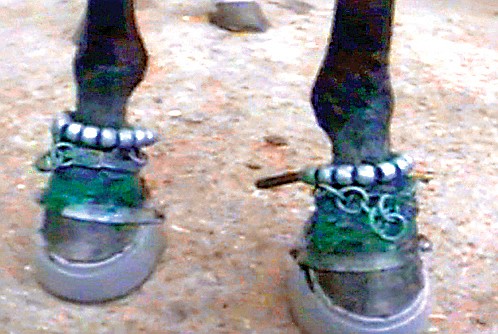To stop the soring of Tennessee walking horses, two congressmen from Tennessee and Kentucky today introduced legislation to end the use of chains, most pads and the industry's self-policing.
The proposed amendment to the 40-year-old Horse Protection Act also would make it a felony to sore a horse -- or abuse it to get a "big-lick" gait for a ribbon or sale.
"How we treat animals is a direct reflection of our character, both as individuals and a nation," said Rep. Steve Cohen, D-Tenn., Thursday as he introduced the Horse Protection Act Amendments of 2012. "There is no ribbon, no prize nor championship worth the price of one's humanity."
The proposed amendment seeks no new money from Congress, and comes at the end of one the most tumultuous years on record for Tennessee's iconic high-stepping horses.
A series of federal prosecutions and a hidden camera video put a spotlight on what it takes to move a walking horse's fast smooth stride to a lunging march -- something spectators have become conditioned to accept in recent decades.
But the bipartisan amendment, also sponsored by U.S. Rep. Ed Whitfield, R-Ky., elicited different responses from horse industry groups and even other congressmen.
The industry's reform group, Tennessee Walking Show Horse Organization, calls the proposal "misguided" and "shameful."
"The attacks from Congressman Whitfield are expected as his wife is the vice president of legislative affairs for the Humane Society of the United States, an organization that stands to gain financially for going after the walking horse industry," said Jeffrey Howard, communications director for the group. Howard also is the publisher of the Walking Horse Report, a print and online trade publication based in Shelbyville, Tenn.
"TWSHO [the industry reform group] is in strong agreement that reform is needed in the industry, and we will work with anyone who truly wants reform," Howard said.
He called it "shameful that elected officials would attack an industry that means so much to small communities across the country, all for political gain. Have they ever talked to anyone who rides a walking horse, to anyone who lives in the communities to which this animal and the sport means something?"
Keith Dane, director of equine protection for the Humane Society, agreed that nearly all walking horse owners and riders love their animals, and he said they are not the people who will be most impacted. In fact, he believes the amendment may make show competition far more fair for the many mom-and-pop competitors.
"A small handful of power brokers in the Tennessee walking horse industry who control its show circuit, but do not represent rank and file [horse] owners, have perpetuated abuse through their judging standards -- which invite people to sore, cheat and cover it all up," Dane said.
He said the industry has claimed for more than 40 years that it would reform, but the eight federal court cases in the past 18 months and a prime-time video -- made by Humane Society undercover workers and turned over to USDA investigators and federal prosecutors -- is what has brought the issue to a head.
"We must finally come to the conclusion that there is no intention of changing. So the Horse Protection Act must be changed, to finish the job that Congress intended," he said.
Taking action
RELATED STORYSentencing memos continue controversy
In a Washington, D.C., news conference, Cohen and Whitfield made similar statements.
"Far too often, those involved in showing the Tennessee Walking Horse have turned a blind eye to abusive trainers, or when they do take action, the penalties are so minor, it does nothing to prevent these barbaric acts," Whitfield said.
"This amendment does not cost the federal government any additional money and is essential in helping to put an end to the practice of soring Tennessee Walking Horses by abusive trainers," he added.
They said the amendment would eliminate self-policing by requiring the United States Department of Agriculture to assign a licensed inspector if a Tennessee Walking Horse show management indicates its intent to hire one. Now, the hiring of a licensed inspector is voluntary and not a mandate.
The industry's largest show, the Tennessee Walking Horse National Celebration, has hired USDA-trained lay inspectors from its own industry.
In recent months, after USDA began requiring mandatory suspension penalties for soring violations, the Celebration lay inspector group refused to adopt the new mandates and sued USDA, claiming the mandates can't be enforced fairly.
USDA has begun the process of decertifying the Celebration's lay inspectors.
On Thursday, USDA spokesman Dave Sacks said it would "not be proper" to comment on proposed legislation.
Congressional reaction
U.S. Rep. Scott DesJarlais, R-Tenn., who during the late August 11-day Celebration shows, wrote to USDA and federal officials about his concern with what he described as overzealous federal inspections, was non-committal about the proposed amendment.
"I'm currently involved in discussions with the Animal and Plant Health Inspection Service, who has jurisdiction over this issue, to mutually ensure the safety and the health of the industry and sport for years to come," he said in a prepared statement.
He said it is important to protect the animals, "but we also want to make sure that the inspection process is fair and minimizes uncertainty."
Sen. Lamar Alexander, R-Tenn., after seeing the hidden-camera video of abuse, said he would work in the Senate to strengthen the act "and add more money to enforce it."
On Thursday he said he had met with Whitfield, "and I look forward to reviewing his proposal."
Rep. Chuck Fleischmann, R-Tenn., said he plans to speak personally with Whitfield soon, and will carefully study the text of the newly introduced legislation. He said he strongly opposes any form of horse abuse and supports an enforcement process that is fair.
Sen. Bob Corker, R-Tenn., wasn't aware the legislation was introduced in the House, but he supports "efforts to deter this kind of abuse," said his spokeswoman Laura Herzog.
